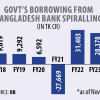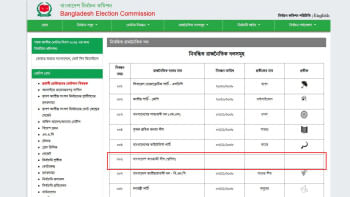The anatomy of macroeconomic challenges in Bangladesh

Until the onset of the current macroeconomic challenges, the story of macroeconomic stability in Bangladesh over the past one and a half decades included sustained and rising economic growth, low volatility of economic growth, keeping the budget deficit at around five percent of GDP, favourable current account balance, a declining share of foreign aid in the gross national income (GNI), low level of external debt as a percentage of GNI, overall robust growth of exports and remittances, growing foreign exchange reserves, manageable inflationary pressure, a stable exchange rate, a high level of installed capacity of electricity, and reasonably stable private investment regime. The list is long. Not many developing countries have enjoyed such macroeconomic stability for a long time in recent years. Even when the Covid pandemic affected the economy, poverty, and labour market in Bangladesh, the macroeconomic stability was not affected much. The government was able to run a large stimulus package.
However, there is the other side of the coin, too. Despite the macroeconomic success, Bangladesh faces several long-standing challenges, which include a very low tax-GDP ratio, a high degree of non-performing loans and weak governance in the banking sector, very low level of foreign direct investment (FDI), misalignment of exchange rate hurting export promotion and export diversification, high cost of doing business, lack of export diversification, sluggish employment growth, slow progress in private sector investment, a large amount of illicit outward money transfer, high amount of subsidies in the annual budget, and inefficiency in budget implementation.
The ongoing global economic crisis is a result of shocks from both the demand and supply sides, but supply-side disruption is the dominant one. Bangladesh, like most developing countries, has been struck hard by this slowdown and the war in Ukraine, which is driving up the prices of food and fertiliser and exacerbating food insecurity and poverty. The pressure of the current price hike is beyond the endurance level of the low-income people in the country. We are also facing an escalated current account deficit, slow growth in remittances, stress on the US dollar exchange rate, and strain on the forex reserves to support a sufficient and comfortable number of months of imports. Bangladesh's economy depends significantly on foreign trade. More significantly, its exports, including ready-made garment (RMG) products, shrimps, leather, etc are heavily dependent on Western consumer demand. Therefore, a global recession is likely to have detrimental effects on Bangladesh's export potential.
There have been three types of responses so far from the government to counter the current challenges: several attempts to contain imports, some devaluation of the currency, and several austerity measures. The government has also started the process of securing a loan from the International Monetary Fund (IMF) in the range of USD 4.5 billion, and some loans from the Asian Development Bank (ADB) and World Bank. There may be some conditions attached to the loans, especially from the IMF, which are likely to include undertaking reform in some critical areas, especially in the banking and taxation sectors. In the past, we have seen major disagreements among stakeholders in Bangladesh regarding adhering to the IMF conditionalities. But this time, we are seeing a kind of growing consensus on the necessity of such conditionalities that might seek reforms.
The government's responses to the crisis have largely been firefighting measures. But the ongoing macroeconomic challenges require undertaking some critical reforms – more than the firefighting measures – to address some inherent structural weaknesses in our economy. The banking sector's weak governance needs to be looked at quite seriously. At the same time, the existing interest rate cap – nine percent on lending and six percent on deposits – needs to be lifted.
The current situation underscores the need for a much bigger fiscal space that the country is seriously lacking. Bangladesh's tax effort has been inadequate and keeps falling short of its potential. Bangladesh has one of the lowest tax-to-GDP ratios in the world – at less than nine percent. The necessity for a prudent fiscal framework has become much more obvious than in the past. It is expected that the government will demonstrate strong political will in putting into effect long-overdue crucial reforms in the taxation sector.
There has been a devaluation of the local currency, we will probably see more of that in the coming days. This is likely to provide some strong incentives for export promotion and diversification. But currency devaluation may not have an auto-trigger for export response and export diversification unless some of the very inherent policy-induced and supply-side issues are taken care of. Many non-RMG export sectors, especially leather, light engineering and agro-processing, suffer from various policy-induced and supply-side bottlenecks in the form of high tariff and tax rates, weak infrastructure, and a lack of access to financing.

As a result of the war and its effects on fuel prices, Bangladesh may get the much-needed impetus it needs to reduce its dependency on fuel imports and switch to a green, resilient, and inclusive growth trajectory. We should gradually reduce ineffective fuel subsidies that typically favour wealthier households and drain the public coffers.
In terms of debt management, currently, Bangladesh is not under pressure like Sri Lanka. Public debt remains sustainable. However, the country needs to be on alert, because many of the country's large-scale projects are financed by foreign debt, and the amount of annual debt servicing is going to escalate quite significantly in a few years from now. Concerns exist regarding the lack of appropriate feasibility studies as well as the cost and time overruns of many megaprojects. Avoiding unnecessary megaprojects and proper feasibility studies of the development projects are crucial. The projects that are already underway could become burdensome if their completion are delayed and the expenses eventually become exorbitantly high. All these could eventually put unwanted strain on the debt burden.
Bangladesh hasn't been successful in attracting large-scale FDI, whereas FDI could be a major source of foreign exchange. The Padma Bridge has opened up a huge opportunity both for domestic and foreign investments. But we need Padma Plus; that means it's not only the Padma Bridge but several other investment-friendly measures that need to be put in place to make the best out of this bridge. To attract FDI, making some special economic zones operational at the quickest possible time is warranted.
While the government has a priority to focus more on macroeconomic stability and economic recovery, it is equally important to address the issues of poverty, vulnerability, and rising inequality. Over the last two decades, the successive governments continued spending very low on education, health, and social protection. The repeated failures to increase the shockingly low tax-to-GDP ratio are the main cause behind low social spending. However, there are also concerns that the policymakers have not yet set in place the proper priorities when it comes to making significant investments in social protection, healthcare, and education.
All the structural measures are meant to make the underlying economic fundamentals of the country stronger to counter the short-term turbulence and achieve the long-term goals. Bangladesh has been enjoying macroeconomic stability for a long time, which created a reasonably resilient long-term path for its economy. But policymakers need to be very careful about these very strong short-term shocks. Unless the necessary structural reforms are undertaken, these short-term shocks can destabilise the long-term path quite significantly.
Dr Selim Raihan is a professor at the Department of Economics of the University of Dhaka, and executive director at the South Asian Network on Economic Modeling (Sanem).

 For all latest news, follow The Daily Star's Google News channel.
For all latest news, follow The Daily Star's Google News channel. 











Comments